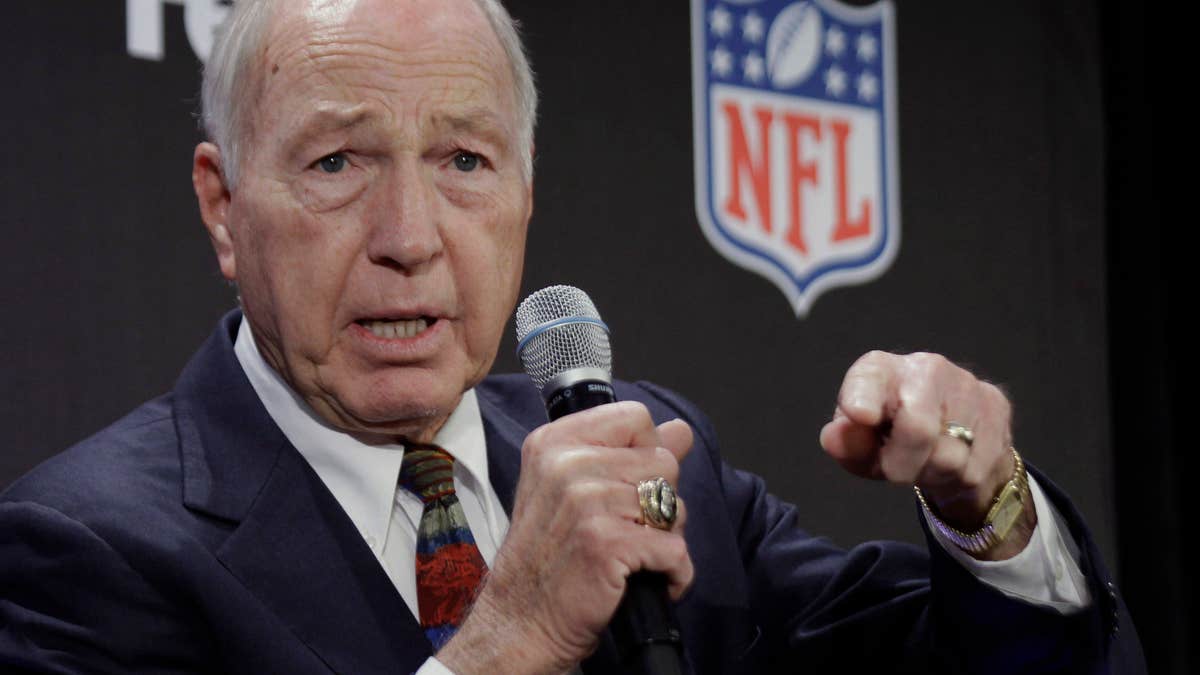
Feb. 2, 2011: NFL Hall of Fame quarterback Bart Starr speaks during a news conference in Dallas. (AP)
Green Bay Packers Hall of Fame quarterback Bart Starr is participating in a clinical trial using stem cells as a possible treatment for strokes.
Starr suffered two strokes and a mild heart attack last September. His family said Wednesday in a statement released by the Packers that Starr is participating in the trial.
"Following Bart's strokes, our family began to investigate numerous therapy options," the family said. "Several months ago we applied for and were accepted into a clinical trial using stem cells.
"Friday we safely returned home from the first of the two treatments," the family added.
Starr, 81, is beloved by Packers fans after leading the team to five NFL championships as well as the first two Super Bowls. He played in Green Bay from 1956 to 1971, and went on to coach the Packers from 1975 to 1983.
Starr made regular appearances at Lambeau Field after his retirement.
Details of Starr's participation in the study would be shared "at an appropriate time in the future," the family said. They wanted to give Starr a chance to fully participate in the clinical trials and "let the results, if any, to speak for themselves."
Adult stem cells are undifferentiated cells found throughout the body that can divide rapidly and help repair tissue. The belief is that they can serve as reinforcements to an injured muscle or joint, but there's no definitive proof of that and treatments are considered experimental. The Food and Drug Administration limits such efforts domestically, but clinics elsewhere are much more aggressive.
NHL Hall of Famer Gordie Howe, 87, underwent an experimental treatment in Mexico after a stroke left the former defenseman unable to walk and barely able to speak. Howe's family had been offered an opportunity from San Diego-based Stemedica Cell Technologies to take part in a clinical trial in Tijuana.
While still cautious, Howe's family said he has had a "life-changing" turnaround. Howe planned to have another round of treatments in June.
The news of Howe's treatment caught the attention of Jerry Kramer, the Packers guard best known for throwing a block that allowed Starr to score a touchdown on a quarterback sneak with 13 seconds left to win the NFL Championship in 1967. The 21-17 victory over Dallas became known as the Ice Bowl for being played in frigid conditions at Lambeau.
Starr's family ended up reaching out to Howe's family earlier in the year, said Howe's daughter, Cathy Purnell.
Neither Purnell nor Kramer knew where Starr was receiving his treatment. Kramer wasn't sure if Starr's family had heard about stem cell research from others as well.
A self-described "stem cell fan," Kramer said he has received therapies that have helped with his hip.
"There's a tremendous amount of hope, potential and possibilities," Kramer said about stem cell research in general.
Kramer, who turns 80 next year, has been curious about nutrition and aging, especially after the toll his body took from playing in the NFL. He said he has visited labs and spoken to top researchers at Harvard, MIT and the University of Wisconsin.
He warned those looking for information on stem cell treatment to focus on leading research labs and universities. Kramer cautioned that it is still unclear how such experimental treatments might affect different patients.
But he pointed to Howe's case as one positive sign.
"We're all thinking of Bart," Kramer said, "all love him, treasure him and hope to God he might get a break on this."
In return, Starr's family has drawn strength from the outpouring of support from friends and fans.
"We are working hard toward the one goal he most cherishes: a return to Green Bay for a Packers game," the family said.
